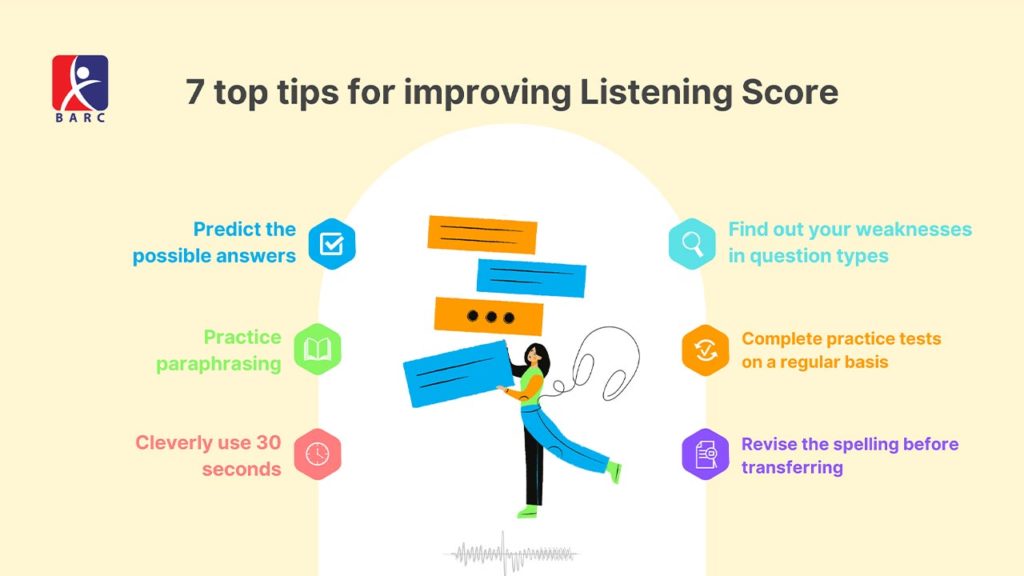
How to Improve IELTS Listening Score
A good IELTS score is a wall between you and your dream. Now, do you know what is the barrier between a good score and a poor score? Practice makes all the difference. But wrong way practice can lead you to an unexpected score and thus make you frustrated. So what’s most important? Of course, practice, and then comes the proper strategy of practice. This blog will help you learn tips and tactics for boosting your IELTS Listening score.
7 top tips for improving your IELTS Listening Score
1. Predict the possible answers
If you compare a band 6 holder with a band 8 holder, this is one of the major aspects found in band 8 holders. I achieved 8.5 in Listening on my test And I have noticed that the better prediction skills I can gain, the easier it is. The question arises of how to predict. For this, let’s look at an example.
Example questions: How to ………………..and cook with seasonal products
Source: (Listening test 1, Cambridge 13)
How and what to guess?
Well, you can see the gap is before the word ‘and’, and what’s after ‘and’ a verb (cook). Now, since there is a verb after and there needs a verb before and. You’ve guessed the type of word needed for the gap. How about assuming the word now? Again consider the word after ‘and’ (cook) as a basis, hence, you can put forward words like purchase, wash, choose, measure, and so on. That you’ve understood that the gap needs a verb will substantially help you to find the answer as soon as you listen to the audio.
Example question 2: She found urban birds were often braver but were afraid of situations that were…………………………….
Let’s guess the possible answer. What sort of part of speech does the gap demand? Adjective? Yes, you’ve got it correct. According to the meaning and structure of the sentence, it seems that an adjective can best fill the gap here. Now guess the word itself. Imagine different forms of situations. What do situations tend to be like? Good, bad, favorable, unfavorable, easy, difficult, challenging, new, familiar, etc.
What’s most pivotal is to develop this anticipation ability, but you don’t have to be 100% correct all the time.
2. Practice paraphrasing
If you claim that IELTS is a game of paraphrasing. I will not possibly mind giving you 9 out of 10. Whether in reading or in listening, your ability to recognize paraphrasing can grow the possibility of a high band two-fold.
Example question 1: How much time for volunteering does the company allow per employee? (Listening Test 2, Cambridge 13)
Audio script: The company will pay for eight hours of your time.
In the example above, the word ‘volunteering’ is paraphrased by ‘of your time’
Example question 2: Where will the digital inclusion day be held? (Test 2, Cambridge 13)
Audio script: This year, instead of hosting the event in our own training facility, we are using the ICT suite at Hill College, as it can hold far more people.
You have noticed that the word ‘held’ in the question is paraphrased by the word ‘host’ in the audio clip.
The sooner you can recognize paraphrasing like these, the more accuracy you’ll get in your listening paper.
3. Cleverly use 30 seconds
One of the obstacles for many candidates is they fail to complete reading each of the questions of a part within the due time. As a result, they get lost when you deal with listening to the audio clip without having a look at all the questions of a particular part. So when you are asked to check your answers after each part and are given 30 seconds time, you are advised to utilize that time to quickly have a glimpse at the questions of the following sections that you are going to deal with.

4. Find out your weaknesses in question types
As I have discussed there are multiple types of questions you may confront in the listening test. Possibly in terms of most of you, you may not do equally good at all the question types once you are at the beginning stage of your practice. For instance, you may find writing digits hard.
In that case, you practice this particular question type more than others. Or, suppose MCQs seem to you a bit daunting; in that case, you need to focus more to fix the problem.
While doing this, the best way to improve fast is to identify your mistakes after your first attempt and listen again with the typescript open in front of you, and then try to analyze the reason behind the mistakes you’ve made. This is a sustainable technique that will drive you to a great band score in listening and IELTS.
5. Complete practice tests on a regular basis
Can you imagine what will happen if a human has everything but the brain? Could this be enough for being an accomplished human? Presumably NO. Even if you have hands, eyes, legs, and everything else except for the brain, everything will be in vain.
Similarly, despite following the rest of the tips, unless you become mindful of applying this strategy, all the other tips will be in vain. So you have to complete full tests from reliable IELTS materials like the Cambridge IELTS series.
Complete 1 practice test, for example, daily; this will shape you to be unstoppable with your performance. Consider listening as a knife, and the more practice tests you complete with the proper approach discussed in the fourth point above, the sharper your listening skills will be.
6. Check word limit when answering
Notwithstanding the fact that you have pointed out the right answer, you have to stay frustrated unless you check the word limit mentioned in the instruction.
No one will want to miss marks just being a bit less aware of the word limit. Always do circle the word limit before starting jumping onto the questions. In fact, this can save you from any unexpected band score.
7. Revise the spelling before transferring
Interestingly, unlike IELTS Reading you will be given extra time to transfer your answers to the answer sheet. Without an iota of doubt, there are many candidates being the victim of this trap. Whether being stressed out or being oblivious to checking answers a second time, unfortunately, some candidates misspelled words being subconscious or being in hurry.
Look, unless we are as slow as ants, we are not supposed to take 10 minutes to submit 40 answers to the listening answer sheet. Therefore, what you can do is to lessen the time to transfer answers with a little quick handwriting, and keep the rest of the time for last-minute checking to avoid unexpected spelling mistakes.
By bringing it into practice, you can promote your score from band 0.5 to band 1.0. Apart from that you can look at Most Commonly Misspelt Words and practice a few words daily to stay confident.
To sum up, I would not say these strategies will earn you a band 8 or 9 but I believe the tips outlined above will go a long way in readying you for a decent score like a band 7 or above. Let me know which strategy(s) you have found most useful. Good luck with your IELTS Listening preparation.


Leave a Reply